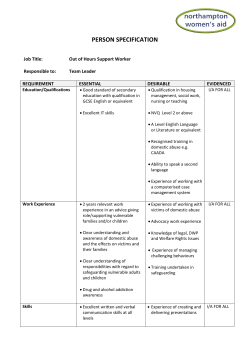
PDF - Flythespark
Page |1 Hertfordshire County Council Job Outline JOB TITLE: Occupational Therapist GRADE: £25,440 - £27,924 REPORTS TO: Team Manager / Deputy Team Manager DEPARTMENT: Health & Community Services TEAM: Community Learning Disability Service (CLDT) Older People and Physical Disability Team (OPPD) PURPOSE OF THE JOB To contribute effectively and professionally to the work of the Community Learning Disability Service (CLDT) and Older People and Physical Disability Teams (OPPD) by providing appropriate responses to those in need of support and taking appropriate safeguarding action as and when required. Occupational Therapists will endorse and act in accordance with the principles of personalisation, ensuring that care and support are person-centred and as far as possible put the people with whom they work in control of their lives. In doing so they will carry out assessments of need, plan and deliver services and review outcomes with the individual, their personal networks and support providers. Our Occupational Therapists will ensure their practice is responsive, inclusive and community based with a clear focus on outcomes. As a senior OT professional, you will bring significant expertise to complex cases. Working and leading practice at the level required set out in the HCPC and COT codes of conduct and standards of practice. And more broadly they will support the delivery of the HCS vision to ‘the People of Hertfordshire so that they feel well informed about what’s available to them so they can lead safe, happy and healthier lives in a way they choose. They feel valued and listened to, have independence and a range of positive things to do. We offer the best and most responsive services in the country. These are services our staff feel proud to deliver and would be pleased to receive.’ countyofopportunity.co.uk Page |2 MAIN AREAS OF RESPONSIBILITY 1. Responds to complex needs Provides professional expertise in situations which are complex or ambiguous. Uses analytical skills to inform assessment, decision making and intervention. Completes support planning with service users to ensure that outcomes identified at assessment are met (within budgetary constraints) through the provision of support, equipment, adaptations and enabling programmes. Actively engages with, assists and provides advice to carers, conducting carers assessments when appropriate, to enable them to sustain their caring role. Makes proportionate, professional judgements applying necessary OT process and expertise. 2. Ensures effective safeguarding and risk management Acts as the lead professional in safeguarding situations in inter-agency and inter-professional situations. Effectively assesses and manages risk, knowing how to intervene proportionately and ensuring people are protected from harm, while protecting their human rights. Undertakes proportionate assessment of vulnerable adults in accordance with current Adult Social Care legislation. Undertake safeguarding investigations under the direction of a manager. Actively engage with, assist and provide advice to carers, conducting carer’s assessments, to enable them to sustain their caring role 3. Addresses adversity and social exclusion Acts as the lead professional (providing information and advice) when an adult is at risk of social exclusion and assist people to deal with adverse circumstance such as poor health, poverty, inadequate living conditions; as well as maximising the strength of individuals, their families and their communities. Actively promotes equality and inclusiveness and challenges discrimination. 4. Promotes independence and autonomy Acts as the lead professional where a person is severely constrained by social or family circumstance and provides support to achieve a reasonable degree to independence and autonomy. Uses a person centred approach, developing countyofopportunity.co.uk Page |3 creative and personalised solutions to assist people to manage their lives independently for as long as possible. Promote independence and community wellbeing, choice and control within a personalisation framework utilising universal services and flexible via the use of self-directed support Assesses the environment in relation to participation in meaningful activity, providing information and advice to individuals, carers and family members. Focusing particularly on environment adaptation, sourcing daily living equipment and assistive technology. 5. Prevention, early intervention and reablement Acts as the lead professional when a person’s health or capacity is deteriorating or likely to deteriorate (without intervention) and the alternative may be premature admission to institutional forms of care by working in partnership with other organisations to ensure an integrated approach to rehabilitation. 6. Demonstrate HCC Values and Behaviours and Professional Standards Carries out duties in a timely and responsive manner, in line with HCPC standards, Codes of Conduct and Standards and HCC’s Values and Behaviours framework Maximises efficiencies in care planning through consideration of charging systems and other funding streams. Keeps and maintain accurate, up to date service user records, in line with professional requirements and departmental recording methods. Identifies gaps in current provision and discusses these with supervisor. Be ambassadors and leaders of the profession both internally and externally 7. Development of Self Maintains accurate and up to date knowledge of resources through continual professional development, supervision and active engagement with local communities. Takes responsibility for own professional development in line with Personal Development Plan, and perform at an appropriate level within the Professional Capability Framework. Undertakes specialist training as required to maintain and progress career within the organisation. countyofopportunity.co.uk Page |4 The duties and responsibilities listed above describe the post as it is at present. The post holder is expected to accept any reasonable alterations that may from time to time be necessary. LOCAL GOVERNMENT ASSOCIATION: STANDARDS FOR EMPLOYERS OF SOCIAL WORKERS AND SOCIAL CARE WORKERS (ENGLAND) Hertfordshire County Council promote the Local Government Associations ‘The Standards for Employers of Social Workers and Social Care Workers in England’ The purpose of the Standards is to sustain high quality outcomes for service users and their families/ carers/communities. The Standards for Employers are devised into three focal areas: Enabling employers to provide a well led professional environment Enabling social work professionals to maintain their professionalism Enabling them to practice more effectively. EQUALITY AND DIVERSITY Hertfordshire County Council is determined to take action to ensure that our belief in diversity and equality of opportunity is integral to everything we do. It will inform every area of activity; from the way we provide services to the way we employ our staff. It is a central responsibility of all councillors, managers, staff and partners. The council's equality policy 'Putting People First' is available on HertsDirect, on the internal intranet 'Compass' or from your line manager. CRIMINAL BACKGROUND CHECK Safeguarding children and adults is of utmost importance to Hertfordshire County Council. The County Council expects employees to abide by legislation and best practice to enable Hertfordshire to achieve this. This role has been identified as requiring a DBS check or Basic Disclosure. You must ensure that the appropriate form is completed and returned as requested by the Recruitment Team, as this will form a contractual requirement. If you require an enhanced or standard DBS check, you must sign up to and maintain registration with the DBS Update Service and allow the council to retain a copy of the disclosure certificate within your personal file. If you fail to disclose any caution, reprimand or conviction which is later identified on your DBS check you may be subject to disciplinary action and the County Council has the right to suspend or dismiss you. In line with the requirements of the Update Service you will be required to maintain your personal information. The council will review your DBS record periodically to identify any changes in circumstances that may be detrimental to your employment. countyofopportunity.co.uk Page |5 Please note that additional information referring to the check is in the guidance notes to the application form. If you are invited to an interview you will receive more information. HEALTH AND SAFETY It will be the duty of every employee while at work to take reasonable care for the Health and safety of themselves and of other persons who may be affected by their acts or omissions at work. Our offices countyofopportunity.co.uk Page |6 Person Specification Occupational Therapist H8 When applying, please include anonomised case examples where appropriate, of how you meet each area of the job purpose, using the person specification below to inform your response within your supporting statement. Please ensure you outline your suitability for the post described Qualifications and Knowledge Relevant Demonstrable Experience of: Skills and Abilities Essential Criteria Desirable Criteria Social Work degree, social work diploma, CQSW or CSS Degree/ Diploma / Postgraduate / Masters qualification in Occupational Therapy Registered with the Health and Care Professions Council (HCPC) Working with adults / children within a health and social care setting Involvement in multi-agency work Adult Social care and legislation, strategies and guidance relevant to the post Mobilising a range of services as part of the care management practice Clinical reasoning and application Social work or occupational therapy assessment, care management and safeguarding Risk management and positive risk taking Human rights legislation and how these laws protect the rights of adults The integration agenda - working as part of a multi-disciplinary /agency team The personalisation agenda - applying creative problem solving to maximise independence Strong IT, report writing, written skills; Strong interpersonal communication skills, flexing approach and language to meet the needs of service user Assesses and records eligible and non-eligible needs, drawing on evidence based practice to inform your response Identifying a range of people that may need to engage with as part of the care countyofopportunity.co.uk Evidence of on –going Continuous Professional Development (CPD) Completed the Assessed and Supported Year in Employment Best Interest Assessor qualification Approved Mental Heath Practitioner Practice Educator Qualification Master level modules in specialist areas Staff or student supervision Applied knowledge of at least one of the following: Mental capacity Act; Mental Health Act; Care Management; Continuing Health Care, Care Programme Approach Works within a scheme of delegated authority Page |7 Behaviours management process Works within HCC Values and Behaviours Framework Evidence of core HCPC values and behaviours– Standards of Proficiency for Occupational Therapists Is presented, motivated, reliable, dependable, self-confident with an ability to work autonomously Promotes independence and community based solutions Demonstrates a commitment to lifelong learning, including sharing knowledge with others countyofopportunity.co.uk Page |8 KEY QUESTIONS FOR SUPPORTING STATEMENT As part of the on line application process you will be required to provide a supporting statement based on the following key questions. This is your opportunity to evidence how your skills, knowledge and experience match what we are looking for and shortlisting for interview will be based upon your statement. If you do not supply a supporting statement, your application may be rejected. KEY QUESTIONS 1. Provide an example of how you have undertaken an assessment of need, using your core communication skills to identify an individual strengths and opportunities. What was the outcome? 2. Tell us why accurate and clear IT recording is important. Provide an example of how you have used IT to support good practice. 3. Provide an example of how you used your professional abilities to develop and maximise support networks with and for, service users and carers. 4. Provide an example of where you have used reflective supervision to effectively aid your professional practice and development. 5. Provide an example of when you have managed conflicting priorities whilst meeting the needs of the service. 6. Tell us how you think your practice will change as a result of the implementation of the Care Act. countyofopportunity.co.uk
© Copyright 2025




















